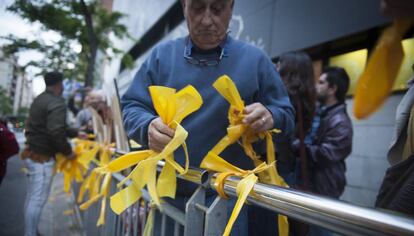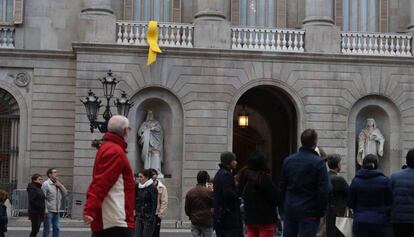Attorney general weighs in on row over yellow ribbons in Catalonia
The regional government wants to prosecute anyone removing the symbols – which represent support for jailed pro-independence leaders – from public spaces

An ongoing row over yellow ribbons being displayed in Catalonia in support of jailed pro-independence politicians reached the Spanish attorney general on Monday, who laid out her position as to whether placing the ribbons in public places, and indeed removing them, constituted any kind of criminal offense.
Ribbons of varying sizes have been appearing all over the northeastern Spanish region for months now, placed by supporters of independence for Catalonia from Spain. Those in favor of the ongoing unity of the country, however, have been removing them – in some cases in an organized and systematic manner.
The Catalan police stopped a group of 14 people who were about to remove the ribbons in the south of Tarragona
The symbols represent support of the former heads of pro-independence associations Jordi Sànchez and Jordi Cuixart, and politicians such as former Catalan Republican Left (ERC) leader, Oriol Junqueras, who, along with several other key figures from the previous regional government, have been in pre-trial custody since November for their role in the passing of last year’s unilateral declaration of independence in the Catalan regional parliament.
Among other reasons, Junqueras and his former colleagues were jailed by a High Court judge on the basis they presented a flight risk given that several other Catalan politicians – including ousted premier Carles Puigdemont – fled Spain to avoid arrest. They are currently the target of extradition proceedings to bring them back to the country to face trial.
In the early hours of last Friday, the Catalan regional police, the Mossos d’Esquadra, stopped a group of 14 people who were about to remove the ribbons from the streets of a number of municipalities in the south of Tarragona. Among the group was a member of the Civil Guard.
Spain’s attorney general stated there “is no kind of offense in placing or removing” ribbons in public spaces
The Catalan police have begun legal action against the 14 on the basis that their actions may be in contravention of the so-called “Gag Law,” wide-ranging and deeply unpopular legislation passed by the previous Popular Party (PP) government and aimed primarily at cracking down on street protests, as well as giving the police greater powers to stop citizens from, for example, taking pictures of officers while they carry out their duties.
The PDeCAT and ERC political parties, both of whom form part of the Catalan government, have called for the Gag Law to be repealed.
When the police searched the vehicles of the group of 14 people on Friday they found box cutters, flags, flashlights and maps of the routes they were taking to remove the secessionist symbols. There was also written advice about how to “clean up” the areas and advice on the precautions they should take in order to avoid being intercepted by opposing groups.
The interior department of the Catalan regional government has begun legal action against the 14, warning via a Twitter post that they could face fines ranging between €601 and €30,000.
Using the police to repress those who take the ribbons down is illegal and an aberration
Ciudadanos’ parliamentary spokesperson Carlos Carrizosa
Spain’s attorney general, María José Segarra, stated on Monday however that there “is no kind of offense in placing or removing” ribbons in public spaces, and added that both actions “form part of freedom of expression.
Segarra, who was taking part in an event in Santander, would not go as far as to offer an opinion on the actions of the regional government or the Mossos.
The center-right Ciudadanos party, which is fiercely opposed to the Catalan independence drive, has slammed the regional government for its approach to those found to be removing the ribbons. “Using the police to repress those who take them down is illegal and an aberration,” wrote the party’s spokesperson in the regional parliament, Carlos Carrizosa, on Twitter yesterday. Meanwhile, pro-unity association Societat Civil Catalana (SCC) accused regional premier Quim Torra of “using the Mossos to repress dissent.”

A number of public buildings also bear the ribbons, something that violates the concept of the neutrality of regional institutions. “If the government doesn’t want to clean up the illegal separatist propaganda from public spaces in Catalonia, we will do it ourselves,” stated Ciudadanos leader Albert Rivera.
English version by Simon Hunter.
Tu suscripción se está usando en otro dispositivo
¿Quieres añadir otro usuario a tu suscripción?
Si continúas leyendo en este dispositivo, no se podrá leer en el otro.
FlechaTu suscripción se está usando en otro dispositivo y solo puedes acceder a EL PAÍS desde un dispositivo a la vez.
Si quieres compartir tu cuenta, cambia tu suscripción a la modalidad Premium, así podrás añadir otro usuario. Cada uno accederá con su propia cuenta de email, lo que os permitirá personalizar vuestra experiencia en EL PAÍS.
¿Tienes una suscripción de empresa? Accede aquí para contratar más cuentas.
En el caso de no saber quién está usando tu cuenta, te recomendamos cambiar tu contraseña aquí.
Si decides continuar compartiendo tu cuenta, este mensaje se mostrará en tu dispositivo y en el de la otra persona que está usando tu cuenta de forma indefinida, afectando a tu experiencia de lectura. Puedes consultar aquí los términos y condiciones de la suscripción digital.








































